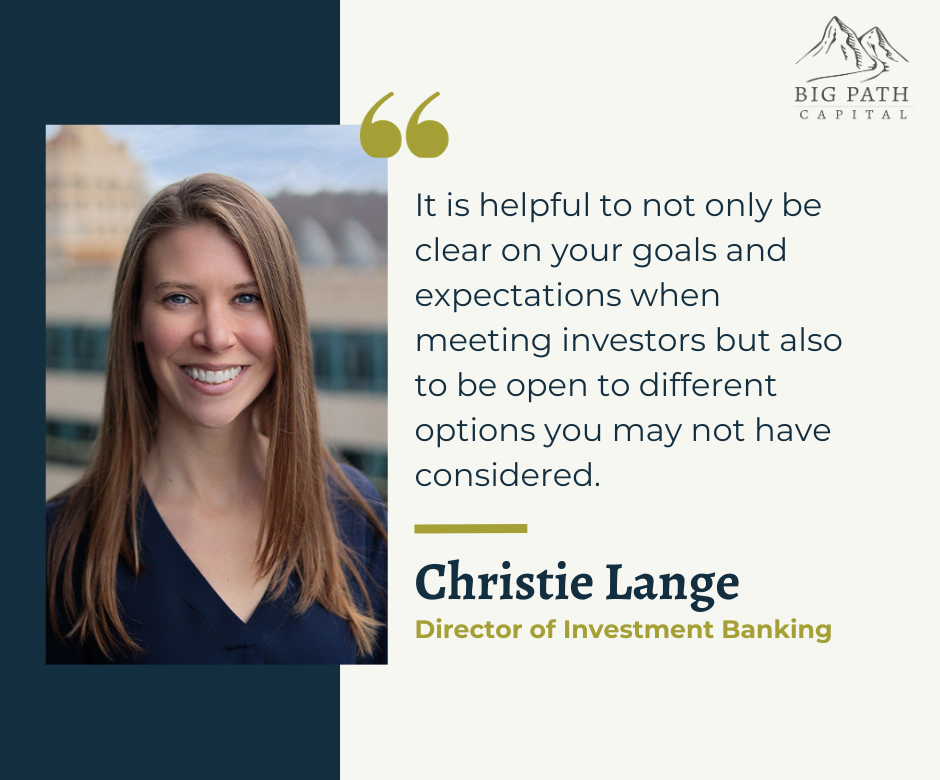In her role as Director of Investment Banking at Big Path Capital, Christie Lange sees the importance of trust and transparency while assisting clients with capital raises, purchase and sale strategies, and other transitions. Since joining the Big Path Capital team in 2018, Christie has built strong relationships with mission-driven clients that help amplify the impact of their current and future work.
In this Q&A, Christie shares more about the journey to her current role, capital strategies for social entrepreneurs, and how mission-driven clients continue to inspire her everyday work at Big Path Capital.
How did your work lead you to your current position at Big Path Capital?
I started in traditional finance in New York City right out of college, eventually making my way to the West Coast after business school. While the work was interesting and challenging, I wasn’t particularly inspired by it. From a personal standpoint, I knew I wanted to move into the impact space in some capacity. I was surprised and delighted to find I could do the same interesting work and be inspired by the opportunity to work with mission-driven leaders and companies at Big Path.
What are three key steps an entrepreneur should take when considering raising capital or selling/exiting their business?
- Align yourself with the right advisors well ahead of a transaction. These can include an accountant/tax advisor, corporate and mergers and acquisitions attorney, investment banker, and financial advisor.
- Get your “house in order.” Be in a position to validate your growth (audited or reviewed financials, strong financial profile, and understanding of relevant metrics), market position (deep understanding of your competitor set), and strength of your team (ideally having long-tenured senior management). Be able to clearly articulate a near-term growth plan.
- Be clear on your goals for a capital raise or sale/exit and seek the advice and experience of those who have gone through similar processes. Make sure that your legacy of impact will continue with the new owner. Speak to a trusted advisor to set realistic expectations given current market conditions and factors specific to your industry and business.
What should a mission-driven entrepreneur consider when seeking mission-aligned investors?
It is helpful to not only be clear on your goals and expectations when meeting investors but also to be open to different options you may not have considered. If your company is at the right stage, partnering with the right advisor that maintains a network of investors you seek will save you significant time and work and likely yield a better outcome.
Once you’ve identified potential investor partners, speak with the leadership of their current and past portfolio companies. I also recommend viewing due diligence as a two-way street: Ask investors questions about themselves, their track records, and their portfolio companies.
Why is it important to develop purchase or sale strategies as an entrepreneur? When should they be developed?
If you are thinking about raising capital or seeking an eventual sale, you’ll want to do so from a position of strength rather than be in a place where you need to raise capital or need to sell. By exploring what investors are looking for and your position in your respective industry as you build your business, you will be in a stronger position to make strategic decisions that support your long-term goals and take advantage of opportunities as they arise. It’s better to be in the position of having the opportunity to raise capital or sell than one where you need to do either.
What do you most enjoy or appreciate about working with mission-driven founders and CEOs?
I have such admiration and respect for my clients — their mission-aligned values and the good they are doing for people and planet are truly inspiring and humbling. I am honored and grateful to be in this role as their trusted advisor; it’s an incredible opportunity to be of service.
What one piece of advice would you give a mission-driven founder who’s just getting their business started?
Raising capital takes a significant commitment of time and energy from both the founder and management. Allow yourself more time than you think you’ll need. The best source of capital is what your business generates. So, especially early on to preserve your ownership, be scrappy and focus on profitability or be resourceful with workarounds. Outside funding isn’t always the best, easiest, or fastest path forward.


